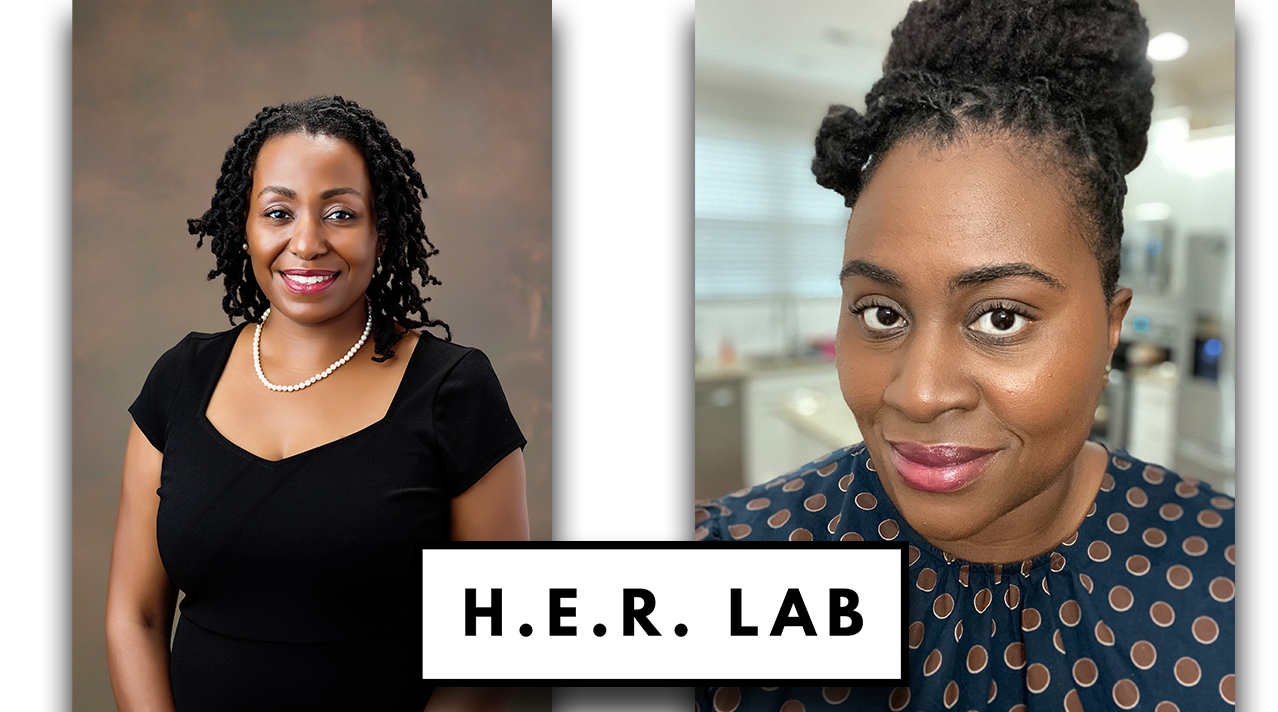Assistant Professors of Public Health Studies Stephanie Baker and Yanica Faustin launched the Health Equity and Racism (H.E.R.) Lab to analyze the roles of "race" and racism as the main contributors to racial health inequities.
Health inequity is a long-standing issue plaguing racial and ethnic minoritized groups in America. That inequity has been on full display over the past year as communities of color have experienced an increased risk of contracting COVID-19. As the health inequity gap continues to widen, a team from Elon is setting out to get to the root of the problem and, more importantly, find solutions.
 Stephanie Baker and Yanica Faustin, assistant professors in Elon’s Department of Public Health Studies, have launched the Health Equity and Racism (H.E.R.) Lab. The H.E.R. Lab is an on-campus hub for research focused on advancing the body of knowledge that illustrates racism as the root cause of health inequities and antiracism as the strategy to move toward health equity.
Stephanie Baker and Yanica Faustin, assistant professors in Elon’s Department of Public Health Studies, have launched the Health Equity and Racism (H.E.R.) Lab. The H.E.R. Lab is an on-campus hub for research focused on advancing the body of knowledge that illustrates racism as the root cause of health inequities and antiracism as the strategy to move toward health equity.
“Structural racism in our society shows up in our institutions and systems and leads to racial inequities, even when people are doing what’s right,” Baker said. “We really want to dive into a deeper understanding about how race and racism have been structured in our society to be capable of producing these lingering, long-term gaps.”
Three areas of focus will comprise the H.E.R. Lab’s work: Research, Capacity Building and Advocacy/Action. The lab’s research will investigate the issue to find better understanding of and solutions for the role racism plays in health inequity. Capacity building will focus on increasing the collective capacity to understand the causes of racial health inequity through collaborative efforts. The advocacy/action piece will take the lab’s research and capacity-building work and turn them into meaningful action.
The most important aspect of the H.E.R. Lab’s research will be a commitment to focus every step of the process – from study design to publication – on moving toward racial equity. Team members will take an antiracist approach to their research and hope to use their findings as an organizing tool to advocate and act for a more equitable society.
“We hope this research helps bring awareness to those who are still in the position of needing that, and for those who are beyond the point of awareness and ready to move toward action, we hope it brings them that catalyst to do that,” Faustin said.

Baker and Faustin will work alongside a select group of passionate students to carry out their work. Students will collaborate with Baker and Faustin on projects but also contribute individual research of their own. Student members of the H.E.R. Lab include Victoria Colbeck ‘22, Deena Elrefai ‘21, Kiara Hunter ‘21, Nyla Rivers ‘22, Min Stanwyck ‘21, Queen Assata Stephens ‘22 and Mia Wilson ‘21.
As the H.E.R. Lab looks to take on racial health inequity from an academic standpoint, it will also operate through work with community partners. Five visionary members, community leaders and experts in the field of racial health inequity, will offer expertise and collaboration on the lab’s projects. The visionary members include Drs. Vijaya K. Hogan and Diane Rowley, Baker and Faustin’s mentors and faculty at the University of North Carolina at Chapel Hill Gillings School of Global Public Health, who have done extensive research and intervention development on this topic. The group also includes former American Public Health Association President Camara Phyllis Jones, co-founder and managing director of The Racial Equity Institute Deena Hayes-Greene, and REI Senior Trainer Monica Walker.

The H.E.R. Lab officially launched on April 11, the last day of National Public Health Week and the first day of Black Maternal Health Week. As Baker and Faustin begin their journey toward making a real impact on the issue of racial health equity, they hope to one day expand their initiative into new communities and onto new campuses to find even more partners to take up the fight.
“We’re at a crucial moment in our society where there are some opportunities that didn’t present themselves before that if we can move, we maybe can start to see a different reality for our children and our children’s children,” Baker said.
Baker and Faustin believe this research could one day reshape the way public health workers, health care professionals and community organizers think about racism in the health industry, and they’re excited to get to work.
“Being able to devote my career and my energy toward creating solutions brings me hope for the future,” Faustin said.
The lab will host its first official event on Thursday, April 22, as Baker, Faustin. Hogan and Rowley host a webinar on the R4P (Remove, Repair, Remediate, Restructure and Provide) equity evaluation framework. The framework, which the group co-authored, helps public health professionals analyze the effect of projects or programs meant to address equity issues. More information about the webinar will be released at a later date on the H.E.R website and social media pages.



